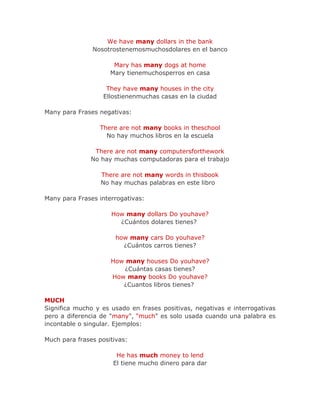
Inglish
- 1. We have many dollars in the bank Nosotrostenemosmuchosdolares en el banco Mary has many dogs at home Mary tienemuchosperros en casa They have many houses in the city Ellostienenmuchas casas en la ciudad Many para Frases negativas: There are not many books in theschool No hay muchos libros en la escuela There are not many computersforthework No hay muchas computadoras para el trabajo There are not many words in thisbook No hay muchas palabras en este libro Many para Frases interrogativas: How many dollars Do youhave? ¿Cuántos dolares tienes? how many cars Do youhave? ¿Cuántos carros tienes? How many houses Do youhave? ¿Cuántas casas tienes? How many books Do youhave? ¿Cuantos libros tienes? MUCH Significa mucho y es usado en frases positivas, negativas e interrogativas pero a diferencia de "many", "much" es solo usada cuando una palabra es incontable o singular. Ejemplos: Much para frases positivas: He has much money to lend El tiene mucho dinero para dar
- 2. We have much to sell Nosotrostenemos mucho para vender I have much to give Yotengo mucho pordar Much para frasesnegativas: We do not have much time for fun Nosotros no tenemos mucho tiempo para divertirnos She does not have much energy to this work Ella no tienemuchaenergia para trabajar I have not much water to drink Yo no tengomuchaagua para tomar Much para frasesinterrogativas: How much Do they pay for the trip? ¿Cuanto pagan ellospor el viaje? How much money Do you have? ¿Cuantodinerotienes? How much milk your baby drinks? ¿Cuantalechebebetubebé? SOME Significaalgunos o algunas, esusadocuandonosotrostenemosuna idea de la cantidad de unobjeto, peroque no creemosque sea necesariodar el numeroexacto. Es utilizado tanto para los sustantivos incontables como para los sustantivos contables en plural. Se usa en frases afirmativas e interrogativas. Por ejemplo: Some para frases positivas: Thereis some sugar in thebasket Hay algo de azucar en la canasta There are some people in thepark
- 3. Hay algo de gente en el parque There are some problemswiththework Hay algunos problemas con el trabajao Some para frases interrogativas: Do youwant some money? ¿Quieres algo de dinero? Do you have some time for me? ¿Tienesalgo de tiempo para mi? Do you want some potatoes? ¿Quires algunaspatatas? ANY Significa algunos o algunas, lo utilizamos cuando nosotros preguntamos acerca de algo o números de cosas de las que no conocemos la cantidad exacta, Anytambien es usado en frases negativas. Por ejemplo: Any para frases negativas: Theredon'thave any eggs Ellos no tienen ningún huevo I don'thave any money No tengo nada de dinero There are not any people in thepark No hay ninguna persona en el parque Any para frases interrogativas: Isthere any bread? ¿Hay algo de pan? Are there any dogs in thepark? ¿Hay algunos perros en el parque? Do youhave any coins? ¿Tienesalgunasmonedas?
- 4. A FEW OR FEW Significa poco/pocos, es usado con nombres u objetos contables. Por ejemplo: There are few apples on the tree Hay pocasmanzanas en el arbol She has few sisters Ella tienepocashermanas He has a few minutes to start El tieneunospocosminutos para empezar Tambiénpodemosusarlaspalabras "only a few" (solamenteunospocos) y "quitea few" (buennúmero) para enfatizar un pequeñacantidad de objetos, porejemplo: There are only a few houses in this town Hay solo unaspocas casas en este pueblo There are quite a few cars in the city Hay unbuennúmero de carros en la ciudad A LITLE Significapoco/pocos, esusado para nombres u objetosque no se puedencontar. Porejemplo: There is little water in the lake Hay pocaagua en el lago You need a little joy in your life Tunecesitasunpoco de alegria en tuvida My boss has little patience Mijefetienepocapaciencia
